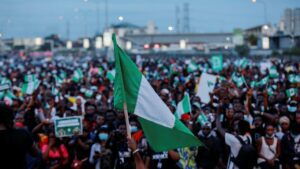
Armed Forces Remembrance Day: Fallen and surviving heroes deserve more
January 15 is Armed Forces Remembrance Day in Nigeria, an annual event to commemorate the nation’s servicemen and fallen heroes.
The event, celebrated on January 15 each year, also honours veterans of World War I and II, as well as the Nigerian Civil War. It is a day set aside for sober reflections on the significance of the armed forces to the country.
While the Armed Forces Remembrance Day is celebrated on November 11 every year globally, it is known as the armistice day, commemorating the end of the first World War.
But with the formal end of the Nigerian Civil War following the surrendering of the Biafran secessionists on January 15, 1970, the date was changed to mark the restoration of Nigeria’s unity.
The annual celebration, which holds every January 15, features parade by the Armed forces across the 36 states and the federal capital territory with the laying of wreaths.
In Abuja, President Muhammadu Buhari presided over the ceremony at Eagle Square on Sunday.
Vice-President Yemi Osinabjo; Senate President, Ahmad Lawan; Speaker of the House of Representative, Femi Gbajabiamila; Chief Justice of the Federation, Olukayode Ariwoola; heads of security agencies and other dignitaries were also present.
Prayers were said in both Christian and Islamic ways. President Buhari as the Special Guest of Honour at the event laid a wreath to honour the fallen heroes
Thereafter, Professor Osinbajo and others took turns to pay respect to the soldiers who paid the supreme price while protecting the nation’s territorial integrity.
In the same vein, ceremonies were held across various states of the federation during which governors too paid tributes to the nation’s fallen heroes.
This ceremony has become an annual routine. Unfortunately, it’s doubtful if it is bringing joy to those that are supposedly celebrated. In essence, the purpose is not totally fulfilled.
A Twitter user @Churchillnnobi tweeted, “Nigerian soldiers remain the most underrated and underappreciated army in the world. As we mark the 2023 Armed Forces Remembrance Day, all I can say is, thanks for your service. Truly Appreciated.”
Governor Benedict Ayade of Cross River State, on the occasion called on the authorities to always remember, and give care and attention to Nigerian soldiers who fought many wars, including the Nigerian Civil War between 1966 and 1970 and are still alive.
He said many of them are now aged and are languishing in health or economic conditions without adequate care and support.
He spoke on Sunday at 2023 Armed Forces Remembrance Day celebration held at the Millennium Park Cenotaph, Calabar, the state capital.
“As we gather today to honour the veteran soldiers, may it also be a great opportunity to sit back and reflect on the pains of those alive.
“Some of these soldiers who fought so hard for the country are still alive and retired but have challenges of livelihood.
“Therefore, an opportunity like this beckons on government at all levels to reflect on the sacrifices these our sons and daughters have made for our country.”
According to Ayade, “today’s Armed Forces Remembrance Day brings to mind the pains, agony and melancholy of our fallen heroes.”
So also, Lagos State Government restated its commitment to support Military and Paramilitary organisations in their strive to maintain security and peace in the country even as it vowed to always remember those who fell while defending the country.
Lagos State Governor who was represented by his deputy, Dr. Obafemi Hamzat gave the assurance on Sunday while speaking at the Parade and Laying of Wreaths Ceremony to commemorate the 2023 Armed Forces Remembrance Day, held at the Remembrance Arcade, Tafawa Balewa Square, Lagos Island.
The Governor stressed that his government would do everything possible to ensure that the military achieves its purpose of establishment which is safe-guiding and ensuring peace in the country.
The state Commissioner for Home Affairs, Prince Anofiu Elegushi, stated that the government will continue to render necessary assistance and support to the families of the fallen heroes; in terms of empowerment and wellbeing.
Elegushi also reiterated that the government will ensure that it meets the needs of the families of the fallen heroes.
It is a good thing to remember and celebrate the fallen heroes. The surviving ones too must not be left out.
Again, we must also remember that the fallen heroes left behind wives/husbands and children that must be catered for. They must not be left to suffer after losing their breadwinners who sacrificed their lives for the territorial integrity of their father’s land.
More importantly, Nigeria as a nation should begin to look into the welfare of its citizens, especially those in the public service. There should be a standard welfare package, made attractive to compete favourably with the western world. We shouldn’t wait till people die before celebrating them.
It has been observed that most Nigerians do not offer their best in public service because they feel their future and that of their families are not secured. This trend most stop. Public servants, especially armed forces who risk their lives, must be encouraged. They must be made to understand that their loved ones would not suffer after their departure.
The words of Lagos State Governor and that of his Cross River counterpart are so soothing. But, it must go beyond promises and rhetorics. There is a need to back them up with action that would put smiles on the faces of our armed forces, dead or alive.


